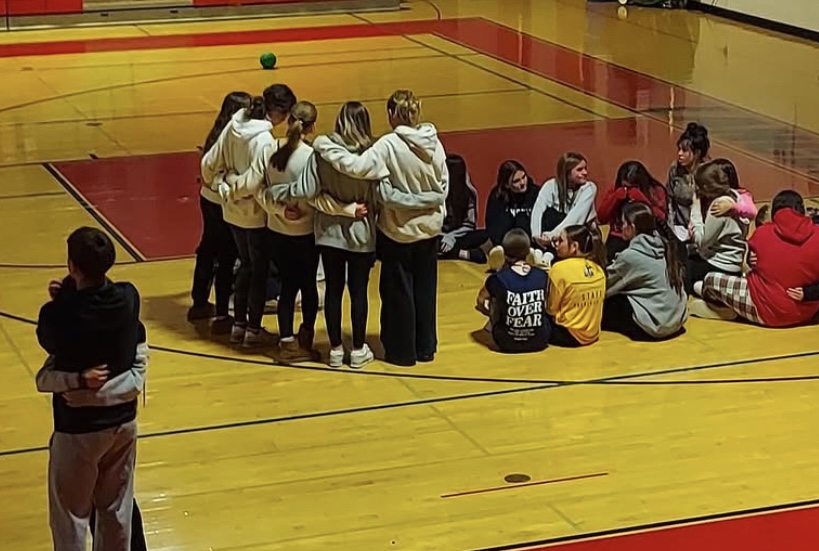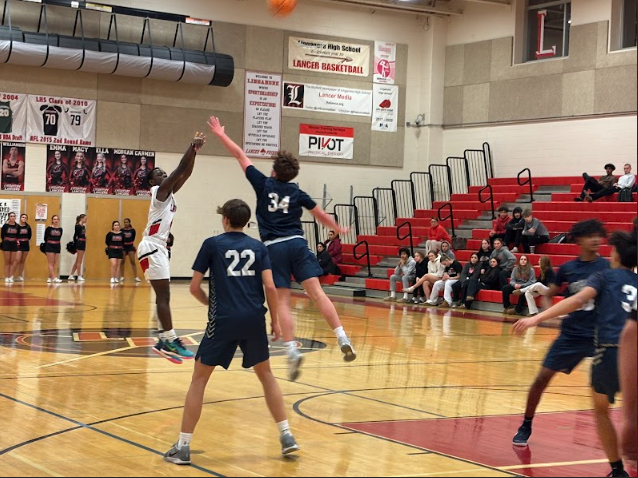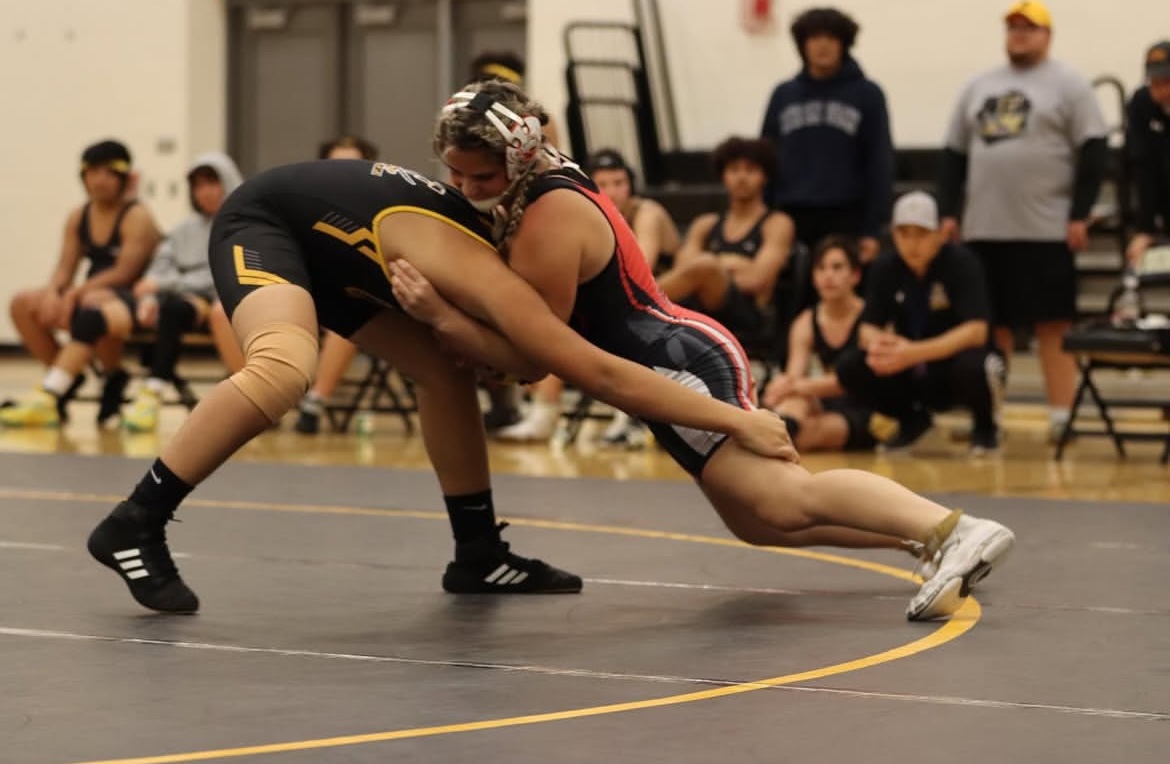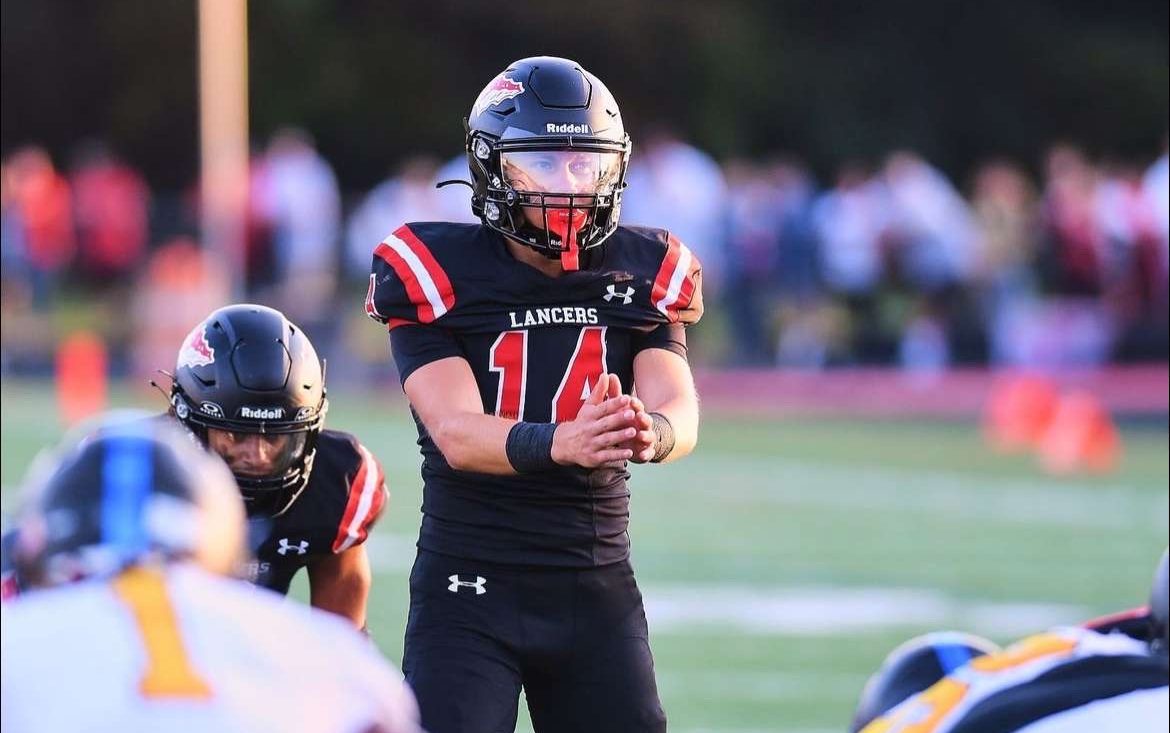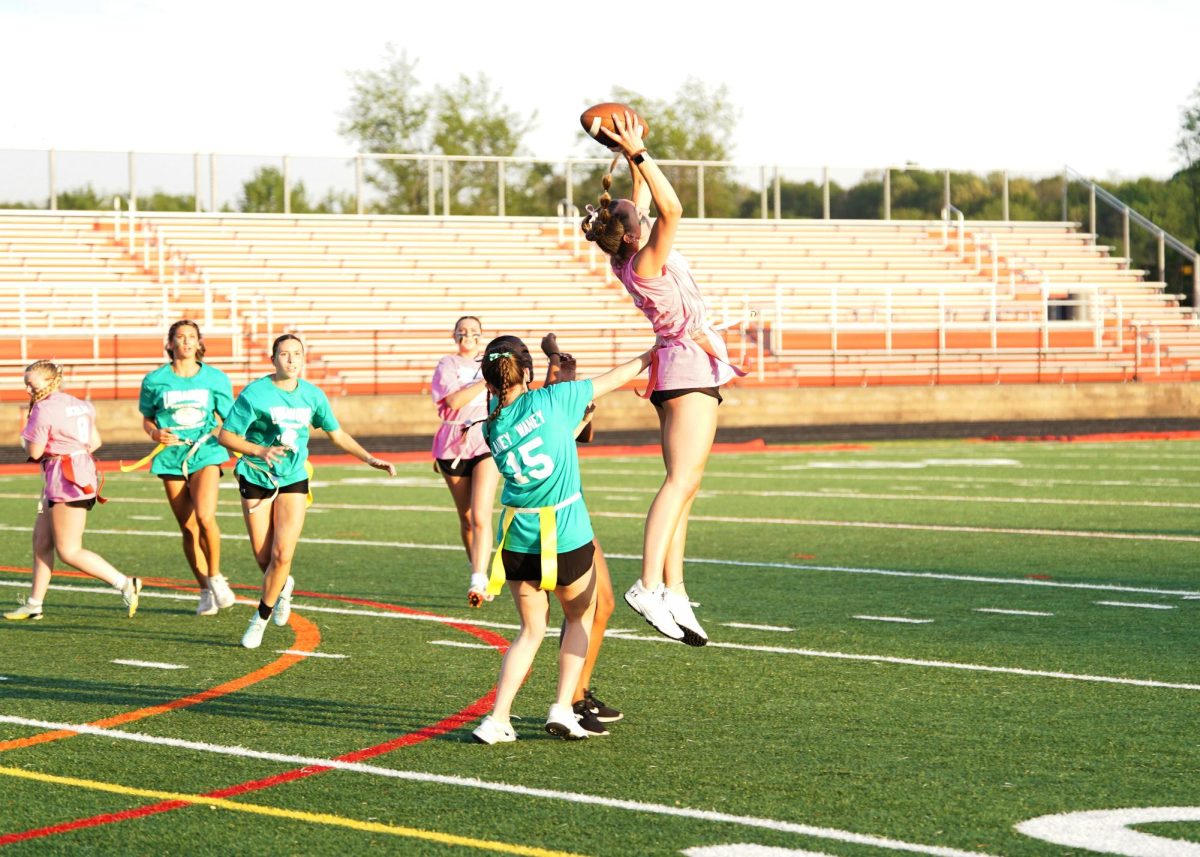Maryland has a history of producing great athletes. Michael Phelps, Katie Ledecky, Babe Ruth– all fantastic Marylanders who have proved they are elite athletes.
Some might say it’s just luck that Olympians, world-record holders, and world championship MVPs all happen to be from the DMV, but these great athletes are not a fluke of birth location. Over time, Maryland has proved that it can consistently produce successful athletes, and especially female ones.
During Women’s History Month, many athletes choose to celebrate those that came before them. With athletes from Maryland in all levels of sports, there is certainly not a lack of athletes to honor.
However, many female athletes choose to also honor athletes that will come after them; they recognize that it is important to not only encourage the next generation of women in sports but also help them to flourish by sharing what they have learned in their own journeys.
At the collegiate level, Zaria Ragler is a sophomore middle blocker on the women’s volleyball team at The Ohio State University. Hailing from Gambrills, Md. and a graduate of Arundel High School, she is no stranger to winning and succeeding as an elite athlete in the world of volleyball.
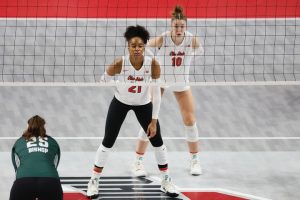
Leading her high school team to two state championship titles, Ragler was named the 2021-2022 Maryland Gatorade Player of the Year. It is no surprise that she went on to become a Big Ten athlete at Ohio State.
However, in a world where athletes are spending 40 hours a week playing their sport, it can be hard to avoid being caught up in the pressure and the buzz of the game.
Ragler emphasized that it is extremely important to her to keep things in perspective and ensure she is always taking care of herself. She recommended all athletes, especially girls, focus on self-care as a part of their preparation for competition.
“Honestly, being a student athlete can be very hard, and it was challenging for me to balance being a student athlete [and] being just a student– being a regular person,” said Ragler. “Everything happens for a reason. Self care– it sounds crazy, but it’s so important [for] pushing yourself through anything.”
As an example, Ragler explained that even just completing a small task that makes her feel at peace can be enough to get herself in the right mental headspace.
“Every Monday, I do a face mask, I do an eye mask, [and] I listen to calming music,” Ragler said. “I think it’s important to start my [week] off with great self care, and I feel like that’s really important for me [as a person].”
Self care is a fundamental part of what keeps NCAA collegiate athletics running. With counseling services recommended by the NCAA and athlete mental health clubs such as Morgan’s Message operating on numerous college and high school campuses nationwide, it is clear that a multitude of people in the athletic world believe in the importance of taking care of one’s mind as well as one’s body as an athlete.
In 2023, the American College Health Association reported that over 30% of college students experienced some level of depression. Those age 18 to 25 are already at high risk for some type of mental health issues. According to the National Institute of Health, college athletes are at an even higher risk for developing disordered eating habits, mental health issues, and self esteem issues.
With strong data showing these negative trends for personal health in collegiate athletes, it is important for them to have strategies and methods to maintain their health while still keeping their grades in good standing and performing on their respective teams.
Remembering that at the end of the day sports are just a game can be helpful for some athletes to keep their mental health under control.
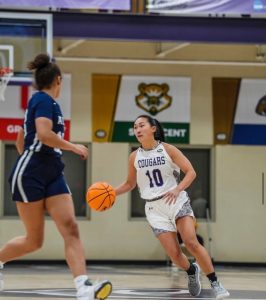
Emily Durkee is a junior guard for the Chatham University women’s basketball team and is originally from Elkridge, Md. Having just led the Lady Cougars to the program’s first-ever President’s Athletic Conference championship title on February 24, her hard work and dedication to the game of basketball does not go unnoticed.
Durkee noted that sports are just as much a mental game as a physical one. She feels as though it is important for an athlete to recognize that there is only so much within their sphere of control.
“Just don’t put too much pressure on yourself,” Durkee said. “I tend to do that. I always think I do the worst when I don’t feel like I did well. I’ve just kind of learned through college that you can’t control everything and that it’s not the end of the world.”
She also explained that sometimes the pressures of outside noise, coaches and getting caught up in your head can feel stifling and overwhelming, but it is vital to keep in mind that at the end of the day, they are just there to make athletes better.
“Listen to coaches and take criticism well because they’re only there to help you,” Durkee said. “Even if you get yelled at, it’s just part of the game; it’s part of growing up and learning. Just take everything not to heart but with a grain of salt.”
Staying locked in to one’s personal game is also important from the coaching perspective. University of Maryland women’s lacrosse head coach Cathy Reese is certainly familiar with this concept, having racked up a considerable number of trophies in both her time as a collegiate player and as a coach.
Reese won three state titles in high school, four NCAA national championships as a collegiate player at the University of Maryland, three national championships as an assistant coach and five and counting as the head coach at Maryland.
She noted that even at the highest level of college sports, it is essential for athletes to look inwards to find solace and motivation to continue their play and keep themselves in a good place both mentally and physically.
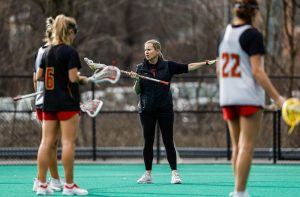
“Remember why you started playing the sport– because it was fun,” said Reese. “Enjoy the moments you have with your teammates. Work hard but have fun. The relationships you make with your teammates will last a lifetime, but it’s important to always remember why you started playing the game.”
The team aspect of sports is crucial for athletes of all levels, whether that be recreational sports in elementary school or professional, Olympic level sports.
Ragler mentioned that playing as a part of a team makes the difference between being successful and failing in college athletics. She reported that it means everything to her to have her teammates’ support.
“Everybody [on the Ohio State volleyball team] wants to be close to everybody [else] and wants to have that bond because we see each other every single day,” said Ragler. “I know if I really needed someone to lean on, I [could] call anybody [from my team].”
This message was echoed by Shaylan Ahearn, a fifth-year midfielder out of Woodbine, Md. who plays for Cathy Reese on the University of Maryland (UMD) women’s lacrosse team. Ahearn has been playing lacrosse for upwards of 20 years, beginning when she was just a toddler.
After being named the 2023 Big Ten Midfielder of the Year and being awarded dozens of other accolades throughout her career at UMD, Ahearn knows what she is talking about when it comes to team culture and the reliability of a team.
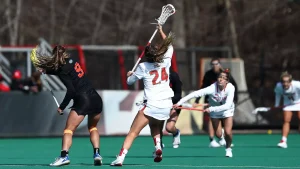
“It’s literally 35 of my best friends [on the team], and it’s so much fun,” Ahearn said. “The energy is always so high, but at the same time, we’re competing and pushing one another to get better so that as a team we know we’re in the best case scenario and best spot for the season.”
With the family aspect of a team comes accountability and a whole new team culture for many athletes. When combining high-level athletes from all around the country to play collegiate athletics, coaches attempt to create a strong bond between girls, while also building a strong program and legacy.
“[We] step on the field wearing Maryland [jerseys], and [we] better feel a sense of pride with that because of the people that have worked so hard before us,” said Ahearn. “You want to fulfill the expectation that everyone has because you’re wearing that jersey. You don’t just step on the field and win every game because your jersey says Maryland. Instead, you work hard, you put in the effort to be able to.”
Ahearn also noted that a legacy can mean more than just the name on a jersey; it can be familial and a goal you may create for yourself.
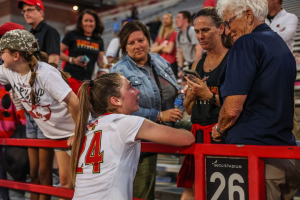
Ahearn’s mother, Tierney Ahearn, played both field hockey and lacrosse at Hofstra University. As a three-season athlete, her mother instilled a drive and fierce competitive spirit in Ahearn from a very young age.
Ahearn noted that her mother’s dedication to getting her active and playing sports is a huge reason why she is still playing the sport today. She is extremely grateful for her mother’s involvement in her lacrosse career.
“She [my mother] was the inspiration behind why I wanted to play, why I wanted to be a midfielder,” Ahearn said. “So I think that she has a really, really large influence on the way that I play now. I think everything that I really know and I’ve learned, it all stems from her original play and her original teaching for sure. She’s the best.”
But the benefits of a team in women’s athletics does not end with team sports– even sports like tennis, gymnastics or swimming can be beneficial for an athlete.
Ciara Ward, a fifth-year gymnast with University of Pittsburgh gymnastics and a Prince Frederick, Md. resident, expressed how competing as an individual is enhanced by her teammates.
“Just being able to have a group of girls to go through the hard days with, the good days, go through wins, go through losses [with], that is crucial,” Ward said.
She also reported that her teammates, while they compete individually as well, have become like her second family and help make Pitt feel like home.
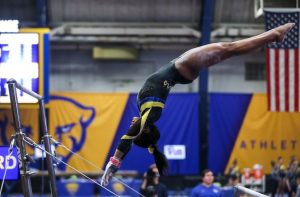
As a consistently high scorer for the Panthers and the recipient of countless awards and accolades throughout her five years at the University of Pittsburgh, Ward is the definition of resilient and hardworking.
During her sophomore year of high school, she broke both of her ankles at the same time and was unable to compete for the remainder of the season. This hindered the recruiting process for her collegiate journey.
However, Ward recounted that keeping confidence in herself and not giving up despite the outside noise is what has allowed her to continue on this athletic journey and stay as successful as she has been thus far.
“It’s just a fact that I am good, and it’s simply a fact that I can do this [gymnastics],” Ward said. “I’ve trained so many hours, and I’ve put in the work. So, there’s no real reason for me to really doubt my abilities. I had a lot of people not in my corner when I got injured. Some people would be like, ‘Oh, it’s not going to happen for you’ or like, ‘Just give it up. You’re not going to get there.’ But, I mean, look at me now!”
For a field of the sports industry that is so often overlooked, Maryland’s elite women athletes prove that if spaces are created for women and girls in sports, they will join, thrive and dominate.
For more updates, scores and information on these elite women from the state of Maryland, follow @marylandwlax (Maryland women’s lacrosse), @pitt_gym (Pitt Gymnastics), @chathamwbb (Chatham women’s basketball) and @ohiostatewvb (Ohio State women’s volleyball).






